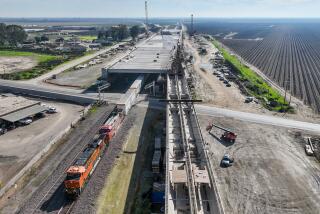East-West Valley Rail Line’s Future in Doubt : Transit: MTA says no money is in sight for the project for at least 10 years.
- Share via
Los Angeles County transportation officials revealed Tuesday that shrinking tax revenues cast a shadow on plans to build a San Fernando Valley rail line, saying there is no money in sight for at least the next 10 years.
Nonetheless, representatives of the Metropolitan Transportation Authority say they will not give up on the proposed east-west Valley line, and will look for alternative funding, such as federal grants, to make up for dwindling transit dollars.
Previous plans called for construction of the much-debated line to begin in late 1995 and passenger service to start in 2001. But one scenario offered by some MTA officials would put the project on hold indefinitely.
The gloomy future of the Valley line was raised in discussions this week as MTA members grappled with a $258-million budget shortfall in the authority’s $3.4-billion annual budget, which is expected to be adopted today.
The budget problem points to a larger, long-term dilemma: how to meet an optimistic 30-year construction schedule for a 400-mile regional rail network with diminishing dollars.
Los Angeles County voters approved half-cent sales tax increases, one in 1980 and one in 1990, to raise an anticipated $800 million annually for rail transit lines. But because of the recession, the sales tax increases have generated only $700 million this year, forcing transportation officials to rethink their funding priorities.
Another $153 million in rail transit dollars were also spent last year by the Los Angeles County Transportation Commission to close a deficit in the budget of the Southern California Rapid Transit District.
Both agencies have since merged to form the MTA.
“The bottom line is very, very simple: There is no money for the east-west line for the next 10 years,” said MTA member Nick Patsaouras. “That is very alarming to me.”
Patsaouras, a Tarzana resident, criticized the MTA for failing to set aside funds for the Valley while making a commitment this year to complete the Red Line subway from North Hollywood to downtown Los Angeles, the Green Line between Norwalk and El Segundo and the Blue Line between Pasadena and downtown Los Angeles.
“The Valley deserves a line this century,” he said, adding that he will press MTA officials to find funding for the line.
Transportation authorities say the agency is committing funds to the Red, Green and Blue lines because planning and construction work has progressed further on them than on the Valley line, which is still the subject of a bitter debate over its route.
Los Angeles City Councilman Richard Alatorre, chairman of the MTA, said the Valley line “is not the highest priority” for the agency.
The MTA has yet to decide between two alternative routes for the Valley line: a 14-mile mostly subway line between North Hollywood and Woodland Hills or a 16-mile elevated rail line over the Ventura Freeway from Universal City to Woodland Hills. Both routes would connect with the Metro Red Line subway.
Partisans of each route, elected officials and homeowners, have been struggling noisily over the issue for several years.
MTA spokesman Michael Bustamante said that regardless of what happens, the Valley line is unlikely to open as scheduled in 2001.
“It doesn’t appear we will be able to keep our schedule for the east-west line,” he said.
Bustamante said most questions about the future of the Valley line will be answered next year when the MTA reviews and makes adjustments to its 30-year construction schedule.
Despite the financial problems, he said work is continuing on studies that are expected to answer many remaining questions on cost and feasibility of the rival Valley alternatives.
County Supervisor Ed Edelman, vice chairman of the MTA, said the budget problems will not mean the end of the Valley line but will certainly delay completion.
“It’s unfortunate because the Valley needs to get its fair share of transportation dollars to reduce gridlock and increase mobility,” he said.
Edelman said the budget problems stem, in part, from an overly optimistic funding scheme that did not anticipate that sales tax income would drop during economic downturns.
Still, Edelman, who represents parts of the Valley, said the Valley line is a high priority. “The issue now is how and when it will be funded,” he said.
More to Read
Sign up for Essential California
The most important California stories and recommendations in your inbox every morning.
You may occasionally receive promotional content from the Los Angeles Times.











